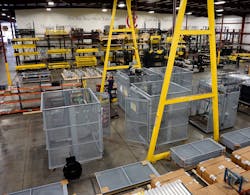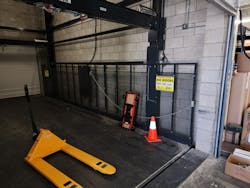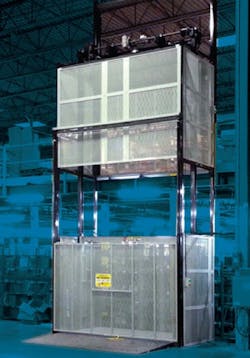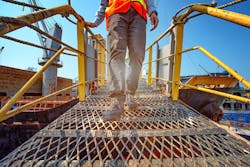How VRCs Are Giving Automotive Dealerships and Its Vehicles a Lift
It’s no surprise that constructing a new automotive dealership is an expensive endeavor. From purchasing the land, material prices, equipment expenses, architectural fees, labor to get the build completed, and planning for any cost overruns that may occur, that dealership comes with a hefty sticker price before the door is open for business.
However, one area of design that does offer tangible cost savings is selecting a material lift instead of an elevator. More automotive dealerships are opting for this route, as a material lift—otherwise known as a vertical reciprocating conveyor (VRC)—can be as much as 75% less to install versus a personnel elevator. For dealerships with a second or third floor, a VRC is a must to move cars and parts.
The VRC Value
Transporting vehicles or even bulky automotive parts back and forth to elevated levels can be a time-consuming task, not to mention a cumbersome safety hazard for employees that could lead to injury and costly worker’s compensation claims. That’s where VRCs prove their worth. VRCs are a cost-effective, safe, and easy way to move vehicles and parts from one level to another.
When it comes to parts, they are safer than using manpower or a forklift, and less costly to operate and maintain than elevators. In fact, the total cost of VRC ownership can be up to three times less than an elevator and can be installed in a fraction of the time.
VRC Installation
Custom Industrial Products (CIP) recently completed another successful VRC installation at a Florida-based luxury automotive dealership that opened in 2022. One of the first steps to engineering the right VRC for the job is communicating with the architectural firm and general contractor to understand the overall scope of the application. This involves learning the weights and dimensions of vehicles that will be moved, the available space for the VRC, and other related information.
For this application, the VRC was an FP Series, Four-Post Lift that had a dual purpose: carrying vehicles up to the third floor for display, while also moving parts such as bumpers, tires, engines, pallets, and other items to the second-floor storage area.
The FP Series is designed for moving larger, heavier loads up to 30,000 pounds, enabling it to carry a vehicle easily. This VRC comes with a carriage size of up to 30 x 30 feet (9 x 9 meters) and a travel height of up to 60 feet (18.3 meters).
The Case for VRCs
When it comes to the expansion of existing automotive dealerships, it’s becoming more commonplace for businesses to look up rather than out. The reason is simple: cost.
A general rule is that it’s always going to be more expensive to expand the footprint of an existing facility. Even if you own the land, expansion means architectural costs, expenses related to pouring slabs of concrete, building materials, a longer timeframe to complete the expansion, along with numerous other costs.
For many dealerships, newfound space can be created through a VRC and mezzanine. Often, these two items can be designed and installed in a matter of weeks at a fraction of the cost of new construction. They are engineered to meet industry standards for local, state, and national building codes, and are custom-built to a customer’s exact specifications for optimal performance and functionality.
Moving items with a VRC is much more efficient and safer than having employees carry parts upstairs or using a forklift to hoist pallets to a second floor. Forklifts require a certified driver, at least one spotter during use, and another person on the second floor to lift the gate and receive the pallet. VRCs are more economical to operate and demonstrate a strong ROI in short order.
When vehicles need a lift or space becomes an issue, remember, don’t look out for answers—look up.
For more information on Custom Industrial Products, visit https://customindprod.com/ or call (800) 699-2212.
Custom Industrial Products (CIP) is a manufacturing company with innovative products and solutions that serve the material handling needs of manufacturing, auto dealerships, warehousing, and much more.



